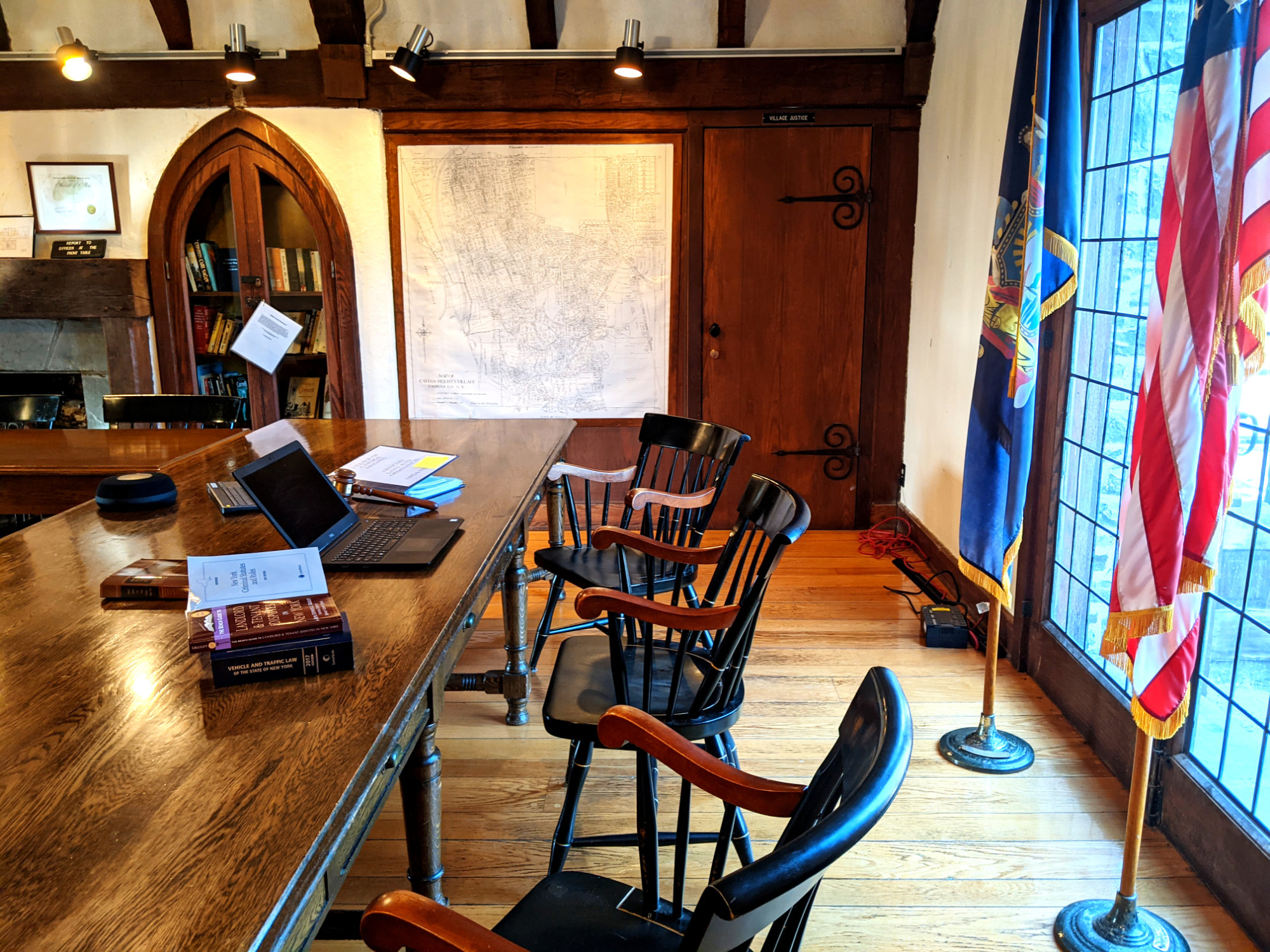Village of Cayuga Heights Court
836 Hanshaw Road
Ithaca, NY 14850
Village Justice: Kathleen Bergin
Email: kbergin@cayuga-heights.ny.us
Phone: (607) 257-3944
Fax: (607) 257-8615
Court Clerk: Penny Grant
Email: pgrant@nycourts.gov
Phone: (607)257-3944
Fax: (607) 257-8615
On-line Court Payments:
The Village of Cayuga Heights Court now offers the option to pay online.
The Village of Cayuga Heights Court serves the community by adjudicating a wide variety of civil and criminal matters. The annual case-load is between 1,000 and 1,500 cases, most of which are Vehicle and Traffic Law infractions, but many are more traditional criminal or civil matters. The court is staffed by a part-time Court Clerk, Penny Grant, and Village Justice, Kathleen Bergin. There is also an Associate Village Justice, who presides in a few cases each year when Justice Bergin feels there might be a conflict of interest or is unable to hold court. Court meets every other Thursday at 5:30pm.
- Rights & Warnings For Traffic Violations
- Court Reminder Form
- Options If You Have a Traffic Infraction Ticket
Options for Virtual Court
Virtual Court Link
Join the meeting now
Meeting ID: 231 622 632 489
Passcode: HPZNQZ
Or Dial in by phone
+1 347-378-4143,,70371039# United States, New York City
(833) 262-7886,,70371039# United States (Toll-free)
Find a local number
Phone conference ID: 703 710 39#
For organizers: Meeting options | Reset dial-in PIN

You are prohibited from recording video or audio, or taking photos or screenshots (22 NYCRR Parts 29, 131)
- Tompkins County Assigned Counsel’s Office
www2tompkinscountyny.gov/ac - Legal Assistance of Western New York
lawny.org - Small Claims Manual
nycourts.gov/courthelp/pdfs/SmallClaimsHandbook.pdf - Tompkins County Bar Association
tompkinsbar.com - Lawyer Referral
Www2.nycourtsgov/courts/6jd/TompkinsCounty/family/lawyers.shtm
Frequently Asked Questions:
Case Jurisdiction
Generally, the court’s jurisdiction is limited to events occurring within the Village of Cayuga Heights. There are exceptions, though, e.g. Justice Bergin can arraign defendants on criminal charges arising in surrounding communities if the justice from the home jurisdiction is unavailable; the Village Court may hear civil small claims cases if the defendant lives in the Village even though the transaction in question occurred outside the Village.
The most common types of cases handled by the Village of Cayuga Heights Court include:
- Parking tickets: Most are handled administratively, but if contested, the justice will arraign and try the case.
- Vehicle and Traffic Law Infractions: The majority of the Court’s cases and usually involve arraignments and, if contested, non-jury trials.
- Other Infractions: Often minor violations of Village ordinances or New York law, and while they are criminal in nature, are less serious than misdemeanors or felonies, e.g. being in Sunset Park after it is closed; permitting one’s dog to run free outside the owner’s property. Like the Vehicle and Traffic Law infractions the Justice has jurisdiction to take the case from arraignment through trial.
- Misdemeanors: Criminal charges whose maximum penalty can be up to a year in jail. They usually are violations of the New York Penal Law, but many Vehicle and Traffic Law violations also are misdemeanors, e.g., driving while intoxicated, reckless driving, aggravated unlicensed operation. These charges, while not quite as serious as felonies, do entitle the defendant to a jury trial and a court appointed (Tompkins County funded) attorney if the defendant is indigent.
- Felonies: The most serious criminal cases, and the Court has preliminary jurisdiction only, i.e. the Village Court may do the initial arraignment (appraise the defendant of his/her rights, appoint counsel and determine bail) and a preliminary hearing (determine if the defendant should be held for action by the Grand Jury).
- Small Claims: Law suits brought by a person against a person or business who is located or has a place of business in the Village. The maximum the Court may award a party is limited to $3,000. These cases are often also referred to the Community Dispute Resolution Center for possible mediation, but if that fails, the Village Court will preside over the trial. Small Claims cases have somewhat relaxed rules of procedure and evidence and often do not have (but may) attorney representation.
- Regular Civil Claims: Like Small Claims cases, the maximum amount that generally may be awarded is $3,000. Unlike Small Claims cases, jurisdiction is generally based on the event in question having occurred within the Village, as opposed to the residence/location of the Small Claim’s defendant being in the Village. Also, the procedural and evidentiary rules are more formal and, while not required, representation by an attorney is usually very helpful.
For your information, the following sheet, Rights & Warnings For Traffic Violations, is provided to all people appearing in the Village Court. It applies most specifically to persons charged with traffic infractions. The rights and warnings for people charged with other offenses can be significantly different, and those are always done separately.
Annual Reports
- Village of Cayuga Heights Court Annual Report: 2024
- Village of Cayuga Heights Court Annual Report: 2023
- Village of Cayuga Heights Court Annual Report: 2022
- Village of Cayuga Heights Court Annual Report: 2021
- Village of Cayuga Heights Court Annual Report: 2020
- Village of Cayuga Heights Court Annual Report: 2019
- Village of Cayuga Heights Court Annual Report: 2018
- Village of Cayuga Heights Court Annual Report: 2017
- Village of Cayuga Heights Court Annual Report: 2016
- Village of Cayuga Heights Court Annual Report: 2015
Looking for something? If you would like to request any governmental records please submit a FOIL Form to the Clerks Office.
